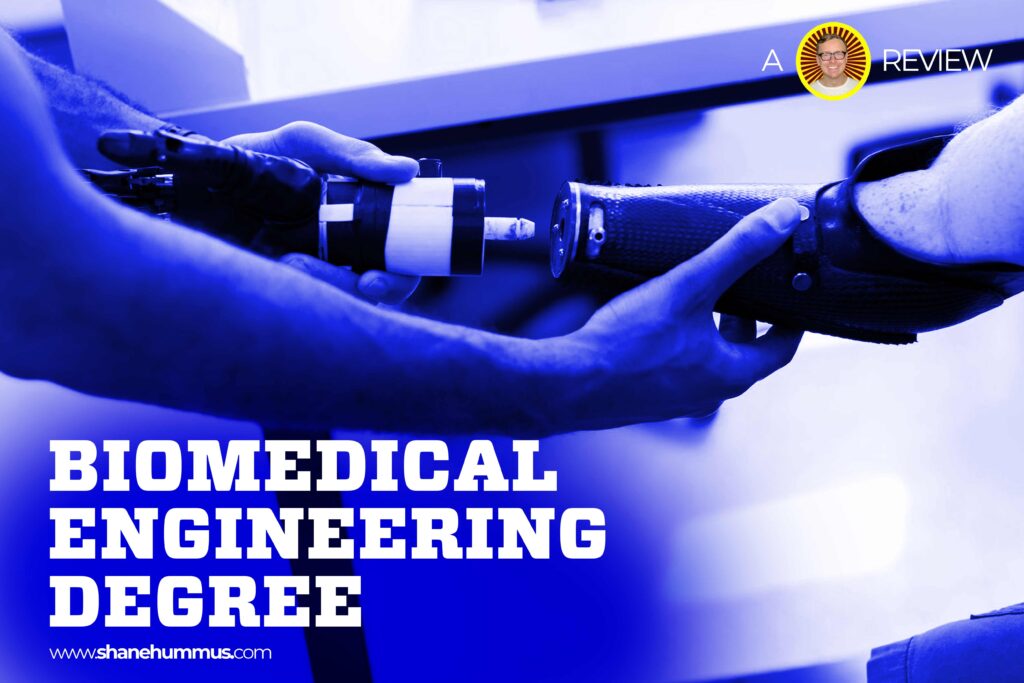Will a Biomedical Engineering Degree Result in a Good Salary?
What happens when engineering meets medicine? An interesting and challenging but highly fulfilling path is created. Biomedical engineering is a field that uses cutting-edge technology, innovative designs, physical sciences, and engineering principles to address medical and biological problems.
This degree is best known for the development of prosthetic limbs and artificial organs, medical imaging systems, and drug delivery devices. This field is important since it is a crucial aspect of improving the health and well-being of people worldwide.
Join us in learning more about this interesting degree, how graduating from it affects your life, and what the most common thoughts are about it.
What is a Biomedical Engineering Degree?

Biomedical engineering students study a combination of engineering, physical sciences, and medicine in one course. This degree’s primary goal is to develop solutions that will solve health-related problems.
When you decide to be a biomedical engineering major student, expect to tackle biomedical sciences topics such as biological systems, biomechanics, biomaterials, medical imaging, and tissue engineering. You will also encounter engineering disciplines, life sciences, and living systems. Along with the course, you should also expect some research projects.
However, you shouldn’t overlook the most common topics in biology, like chemistry, materials science, physics, mathematics, and systems.
Another fun part of this course is that it will allow you to study engineering programs along with biological sciences, as well as advanced technology and concepts like biomedical imaging, molecular biology, and regenerative medicine.
If you’re someone who’s interested in pursuing a medical course but can’t give up the thought of not enrolling in engineering, this degree is perfect for you! With this degree, you’ll experience the journey of both worlds, and you’ll get to help people along the way.
Career Paths for Graduates of Biomedical Engineering Courses
Note that this degree is usually taken over the course of four years. Once you’ve graduated with this engineering degree, there are several career options for you. When picking your career path, it is important to consider your interests, skills, and knowledge about the job.
The most common career paths for this major include biomedical engineer, biomechanical engineer, bioinformatics engineer, and medical device sales engineer. There are also some who pursue a master’s degree to further specialize in a particular field, but having a bachelor’s degree is already okay.
Biomedical Engineer
As a biomedical engineering major graduate, your main responsibilities fall within improving human health and developing medical devices, equipment, or software that will aid in solving medical problems. You may also be tasked with improving the medical technology that your current company uses.
Most of the medical technology that you will work on includes diagnostic equipment, the study of organ systems and the creation of artificial organs, and the development of medical implants. If you plan to work on this path, you can expect to do a lot of research projects with life sciences, biomedical sciences, and biological systems.
You will need to work closely with the people you’re helping. This is important since you will have to create a design that meets the requirements of the patients. In addition, you will have to have constant communication with manufacturers to ensure that the production of the design is on point.

Biomechanical Engineer
If you’re more inclined toward biomedical applications, engineering, and designing mechanical parts, a job as a biomechanical engineer would be perfect for you. As a biomechanical engineer, your main tasks will be to study biological systems and apply principles of mechanics to improve function and mobility.
You can expect to design and improve prosthetics, orthotics, and assistive devices for people who’ve gone through accidents or have disabilities or injuries. When you work as a biomechanical engineer, you will also need to conduct thorough research to understand how a human’s body works and how it will respond to external forces.
Bioinformatics Engineer
When you choose this career path, you’ll mainly focus on analyzing and interpreting biological data using engineering concepts. You will have the chance to develop software and algorithms that can quickly process medical information, like genetic, genomic, and proteomic data.
What’s interesting about this path is that it will allow you to process data, study diseases, and develop new treatments for them. If you choose this path, you’ll most likely work for research labs, pharmaceutical companies, or health care organizations.
Medical Device Sales Engineer
If you’re up for the challenge of selling medical equipment while being a biomedical engineer, then pursuing a career as a medical device sales engineer would be perfect for you. When you choose this path, you’ll be working with medical equipment and device manufacturers.
You’ll need a lot of information about their devices, like how they work, who they’re suited for, and how to use them. As a professional medical device sales engineer, you need to understand the needs of patients and appropriately recommend and provide them with the right products.
If you’re a medical device sales engineer with a lot of experience, you can also work as a manager who provides technical support and training to healthcare professionals. To be an effective medical device sales engineer, you would need to have good communication skills, interpersonal skills, and technical knowledge.
Other Paths for BME Students
There are other paths you can pick, but more often than not, they will already require advanced courses or advanced degrees from professional schools that specialize in sciences and engineering. Some advanced concepts or courses focus on quantitative physiology, biomedical opportunities, applied sciences, and heat transfer.
No matter where you work in this field, you still get research opportunities in the engineering discipline that will allow you to improve human health.
Are Biomedical Engineers in Demand in the USA? (Job Outlook)

Score: 7/10
According to the most recent reports from the Bureau of Labor Statistics, the demand for engineers in this field will increase by 10% during the next decade. This may be a result of the demand for better solutions to existing diseases.
In addition, more and more people have been looking for medical solutions, and this type of engineer plays a huge role in this. Currently, the BLS has recorded that there are 17,900 biomed engineers.

How Much Does a Biomedical Engineer Make? (Salary)

According to Career Explorer, the average salary for a biomedical engineer is around $97,410 per year. For entry-level positions, the salary is around $60,700 per year. If you’re looking for top-level positions, salaries can bump up to $154,800 per year.
Here is a screenshot from Career Explorer:

What is the Satisfaction Rate of a Biomedical Engineer?

In a post by Career Explorer, biomedical engineers are quite happy with their salaries, and they also find their job meaningful. From their site, the score for both factors is 3.3 out of 5 stars. This means that biomedical engineers are quite satisfied with their careers.
Here are screenshots from Career Explorer:


How Do Biomedical Engineering Graduates Fare in the Real World?
I sourced Reddit for some opinions about graduates of this degree and the real world. Here are some threads that talk about the most common questions about salary, graduate school, and more.
What salary should I expect from an entry-level biomedical engineering role?
Here is a quick answer from one Redditor:
Here’s another answer about the salary of biomedical engineering roles, but from a different thread:
Is it worth it to become a biomedical engineer?
This is probably one of the main questions a student will ask when pursuing a degree. I’ve gathered some answers from Reddit to help you make a more informed decision. Here are the threads:
A Redditor mentioned getting higher education if you want to be employable as a biomedical engineer. Here’s the comment:
Is a PhD in biomedical engineering worth the hassle?
Here’s another thread where the OP wanted to know whether getting a PhD was worth the hassle:
These are just some opinions from biomed engineers around the globe. I hope that they at least help you get a better idea of what this degree offers. If you have an interest in biology and medicine and enjoy applying engineering principles to solve problems, then a degree in this field might be a good fit for you.
But before making a decision, here’s a checklist you need to see first.
Is Biomedical Engineering for You? (Factors to Consider)
I wanted to help you get a bird’s-eye view before deciding to take biomedical engineering. I know that making a decision is hard, so here’s something to get you started:
| YES | NO | |
| INTEREST: Do you have a genuine interest in biomedical engineering? | ||
| JOB PROSPECTS: Are there good job opportunities in this field? | ||
| REQUIRED SKILLS: Do you possess the necessary skills to accomplish major requirements and become a biomedical engineer? | ||
| CURRICULUM: Is the curriculum of this degree something that you would like to pursue? | ||
| COST: Will the cost of pursuing this degree fit within your budget? | ||
| TIME COMMITMENT: Are you willing to commit the required amount of time to complete this program and all of its major requirements? | ||
| PREREQUISITES: Have you completed the prerequisite courses necessary for this program? | ||
| ACCREDITATION: Is the program accredited by the relevant authorities? | ||
| FACULTY: Do you believe the quality of the faculty teaching this program is satisfactory? | ||
| CAREER GOALS: Does obtaining a degree in this field align with your long-term career goals? |
Choosing the Best Place to Study Industrial Engineering
When choosing a school for biomedical engineering majors, there are some factors you need to consider. This includes curriculum, accreditation, and faculty quality. You need to look for a school that can offer hands-on learning opportunities and access to internships.
Curriculum
Knowing the curriculum for the degree before enrolling is important. This allows you to know what subjects you’ll be able to take and which specializations are available for you.
Knowing the curriculum also helps you carefully tailor the course you’re taking, which means you’ll get to pick the subjects that perfectly align with your interests.
Accreditation
Another factor to consider is the accreditation of the school you’re going to. You’d want to pick schools with accreditation from reputable organizations. This means you’re getting into a school that has passed the rigorous requirements of accrediting organizations.
Faculty Quality
In addition, you also need to check out the faculty’s quality. A strong faculty would be a team of biomedical engineering engineers that specialize in concepts in this field. You’d also want to check out the credentials of the faculty to ensure that they really know what they’re teaching.
Cost of Education
The cost of education is another crucial factor that will affect your decision. If a university offers expensive courses, but their faculty quality, accreditation, and curriculum are not up to your standards, then you should immediately cross that school off your list.
When deciding which school to pick, always ensure that the cost aligns with the curriculum offered, current accreditations, and faculty quality. This is to ensure that you get what you paid for.
Pros and Cons of a Biomedical Engineering Degree
Pros
- High demand for professionals in the field
- Above-average salaries
- Opportunities to make a positive impact on people’s lives
- Challenging and rewarding work
Cons
- Intense and rigorous program that focuses on mathematics, science, systems, and research
- Limited job opportunities in certain geographic areas
- Requires a strong background in both engineering and biology
FAQs About a Biomedical Engineering Degree
What are things that a biomedical engineer should know?
As a biomedical engineering graduate, you need to know that you must be creative in thinking of innovations. You must know how to think outside the box when dealing with healthcare equipment and devices. In addition, you need to know a lot of stuff about engineering principles and some math to be successful.
What is the biggest challenge in biomedical engineering right now?
Currently, delivering drugs to certain parts of the body is the biggest challenge for biomedical engineers. Though there are already some techniques in place, thinking of more effective and efficient ways to administer drugs is a struggle.
What are the most common courses in biomedical engineering?
This field covers a lot of courses, but the most common ones include bioinstrumentation, biomechanics, biomaterials, medical imaging, tissue engineering, and physical sciences.
Final Verdict
Biomedical engineering is a rapidly growing field that pays well and is considered a rewarding career by most graduates. If you’re someone who is passionate about engineering principles and the field of medicine, pursuing this course would be a great decision.
In addition, if you see yourself as an innovative person who would someday develop new equipment or devices by integrating engineering and medicine, by no means take this engineering degree.
Salary | Score: 9/10
A median salary of $97,000 per year is a really competitive wage in the current market. So, if you’re looking for a high-paying career, considering biomedical engineering is an option. However, you need to note that for entry-level positions, the salary is around $60,000 per year. Still, it’s not a bad starting wage.
Satisfaction | Score: 8.5/10
From the information I’ve gathered from Career Explorer, biomedical engineers are satisfied with both their salaries and the work environment. So, I gave this a score of 8.5 out of 10.
Demand | Score: 7/10
According to the Bureau of Labor Statistics, the demand for biomedical engineers will increase by 10% over the next decade. So, I gave the demand a score of 7 out of 10.
X-Factor | Score 9/10
The x-factor that I need to consider when talking about biomedical engineering graduates is that they have the ability to combine both technical expertise and an understanding of biology and medical science.
With that in mind, biomedical engineers can develop innovative and effective solutions to existing medical problems.

Final Score for the Biomedical Engineering Degree: 8.375/10
Overall, a degree in this field scores highly in job growth, salary, and job satisfaction, making it a great option if you’re looking for something that combines engineering and science.
Alternatives to a Biomedical Engineering Degree
If you’re looking for a career that involves engineering and medicine but don’t think that biomedical engineering is the perfect choice for you, you can choose other degrees, such as the following:
- Bioengineering
- Medical Physics
- Chemical Engineering
- Materials Science and Engineering
- Biomechanical Engineering
Each of these degrees has similar intersections with this degree. So, you can pick among the ones listed above.

… [Trackback]
[…] Read More on that Topic: shanehummus.com/college-degrees/biomedical-engineering/ […]
… [Trackback]
[…] Read More on on that Topic: shanehummus.com/college-degrees/biomedical-engineering/ […]
… [Trackback]
[…] There you will find 97810 more Info on that Topic: shanehummus.com/college-degrees/biomedical-engineering/ […]
… [Trackback]
[…] Read More to that Topic: shanehummus.com/college-degrees/biomedical-engineering/ […]
… [Trackback]
[…] Here you will find 35053 more Info to that Topic: shanehummus.com/college-degrees/biomedical-engineering/ […]
… [Trackback]
[…] Here you will find 25786 additional Information on that Topic: shanehummus.com/college-degrees/biomedical-engineering/ […]
… [Trackback]
[…] Find More Information here to that Topic: shanehummus.com/college-degrees/biomedical-engineering/ […]
… [Trackback]
[…] Read More on that Topic: shanehummus.com/college-degrees/biomedical-engineering/ […]
… [Trackback]
[…] Information to that Topic: shanehummus.com/college-degrees/biomedical-engineering/ […]
… [Trackback]
[…] Read More on to that Topic: shanehummus.com/college-degrees/biomedical-engineering/ […]
… [Trackback]
[…] Find More Information here on that Topic: shanehummus.com/college-degrees/biomedical-engineering/ […]
… [Trackback]
[…] Read More to that Topic: shanehummus.com/college-degrees/biomedical-engineering/ […]
… [Trackback]
[…] Information on that Topic: shanehummus.com/college-degrees/biomedical-engineering/ […]
… [Trackback]
[…] Read More on on that Topic: shanehummus.com/college-degrees/biomedical-engineering/ […]
… [Trackback]
[…] Read More Info here to that Topic: shanehummus.com/college-degrees/biomedical-engineering/ […]
… [Trackback]
[…] Read More on on that Topic: shanehummus.com/college-degrees/biomedical-engineering/ […]
… [Trackback]
[…] Read More on to that Topic: shanehummus.com/college-degrees/biomedical-engineering/ […]
… [Trackback]
[…] There you can find 13237 more Info to that Topic: shanehummus.com/college-degrees/biomedical-engineering/ […]
… [Trackback]
[…] Read More on on that Topic: shanehummus.com/college-degrees/biomedical-engineering/ […]
… [Trackback]
[…] Read More to that Topic: shanehummus.com/college-degrees/biomedical-engineering/ […]